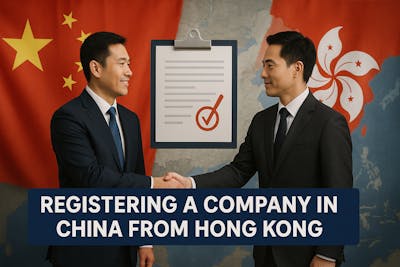China offers immense potential for international companies looking to expand. With the world's largest population, it provides a vast customer base across nearly every industry.
The country is also home to the world’s largest e-commerce market, creating unique opportunities for brands to reach consumers through digital platforms, mobile apps, and social commerce.
Let’s explore the key steps on how to successfully start a business in China.
Step 1: Market Research and Planning
China is a large and active market full of opportunity — but entering it successfully requires thorough research and careful planning.
| Category | Action Item | Description |
|---|---|---|
| Market Research | Research the Chinese Market | Identify demographics, behaviors, and buying habits. Use Baidu, JD.com, and Alibaba for trend insights. |
| Understand the Competition | Analyze competitors’ pricing, marketing, and positioning. Find market gaps and define your edge. | |
| Learn Chinese Laws and Regulations | Study labor laws, consumer protection, and import/export rules. See Step 4 and 5 for registration guidance. | |
| Planning | Develop a Business Plan | Define your model, offering, and market need fit in China. |
| Set Long-term Goals | Outline goals like market expansion, revenue targets, and KPIs. | |
| Financial Strategy | Plan funding, cash flow, costs, forecasts, and required capital (see Step 5). | |
| Marketing and Sales Plan | Use WeChat, Douyin, Xiaohongshu, and Tmall. Consider influencers and cross-border platforms. | |
| Operational Plan | Address logistics, staffing, quality control, and choose a suitable city or zone (see Step 2). | |
| Entry Strategy | Choose WFOE, JV, or RO based on risk/control. Consider PEO or EOR for early-stage entry (see Step 3). | |
| Other Considerations | Understand Local Culture | Learn etiquette, communication norms, and negotiation customs. |
| Localize Your Offering | Adapt branding, language, and design to Chinese consumer preferences. | |
| Build Strategic Partnerships | Partner with local firms for supply chain, retail, or compliance support. | |
| Use E-commerce Effectively | Select the right platforms, logistics partners, and explore live-streaming. | |
| Stay Trend-Aware | Monitor trends like mini-programs, social commerce, and sustainability. |
Step 2: Choose the Right Business Location
Choosing the right location in China is an important step for establishing a thriving business.
It's wise to conduct site visits to shortlisted locations to get a firsthand feel for the environment, infrastructure, and overall vibe.
| Section | Key Consideration | Details |
|---|---|---|
| 1. Define Your Business Needs | Business Type |
- Tech companies: Prefer cities with strong universities and startup ecosystems (e.g., Shenzhen, Hangzhou, Chengdu). - Manufacturing: Look for proximity to raw materials, supply chains, and export hubs. - Service-based businesses: Choose urban centers or financial hubs like Shanghai and Beijing. |
| Customer Proximity | Position near your target market to reduce logistics costs and improve delivery speed. Consider access to end users, commercial zones, or key transportation routes. | |
| 2. Budget & Operating Costs | Cost Factors | Consider office rent, labor costs, local tax rates and incentives, talent availability, and cost of living for staff (especially foreign employees). |
| City Type Comparison |
- Established cities (e.g., Shanghai, Beijing): High costs, strong infrastructure, deep talent pool. - Emerging cities (e.g., Chengdu, Qingdao): Lower costs, growing support for foreign investors, less competition. |
|
| 3. Location Options | Tier 1 Cities | Shanghai, Beijing, Guangzhou, Shenzhen – Preferred by multinationals for their infrastructure, international links, and mature business ecosystems. |
| Tier 2 & 3 Cities | Nanjing, Chengdu, Wuhan, Qingdao – Lower operational costs, expanding consumer markets, and more accessible government incentives. | |
| Free Trade Zones (FTZs) | Ideal for trade, logistics, and import/export businesses. Offer tax reductions, simplified customs procedures, flexible foreign exchange rules, and faster administrative approvals. Benefits vary by location and sector. | |
| Economic Development Zones (EDZs) | Target specific industries such as green energy, biotech, or advanced manufacturing. Offer industry-focused tax incentives, innovation/R&D subsidies, purpose-built infrastructure, and potential partnerships with government and universities. Must align with your sector and long-term goals. |
Step 3: Consider a PEO/EOR or Expansion Partner
Setting up a legal entity in China isn’t always the best or first move for every business.
If you're looking to enter the Chinese market quickly, with minimal overhead, you may want to consider using a PEO (Professional Employer Organization), an EOR (Employer of Record), or working with a local expansion partner.
These options allow you to test the market, hire local staff, and begin operations without formally incorporating a company in China.
- A PEO handles local HR, payroll, and benefits administration on your behalf but doesn’t act as the legal employer.
- An EOR goes a step further — they become the legal employer of your staff in China, while you manage day-to-day responsibilities. This keeps you compliant with Chinese labor laws without needing to form a local entity.
Step 4: Choose a Legal Structure
When choosing how to legally operate your business in China, you have several options to consider, each with its own advantages and drawbacks depending on your desired level of control and the nature of your business.
| Legal Structure | Description | Advantages | Limitations |
|---|---|---|---|
| Wholly Foreign-Owned Enterprise (WFOE) | A company fully owned and controlled by a foreign investor. |
- Full control over operations and profits - Protects brand and business model |
- Complex setup process - Time-consuming registration - Industry-specific restrictions may apply |
| Joint Venture (JV) | A business partnership between a foreign company and a local Chinese partner. |
- Access to local networks and market knowledge - Assistance navigating regulations |
- Shared control and profits - Potential for conflict if roles are not clearly defined - May be necessary in restricted industries |
| Representative Office (RO) | A non-revenue-generating office for liaison, brand promotion, or market research. |
- Easy and fast setup - Good for testing the market and building relationships |
- Cannot engage in sales or generate income - Limited to non-commercial activities only |
Step 5: Understand Registered Capital Requirements
As of China’s 2014 Company Law revision, the removal of statutory minimum capital requirements for most industries was introduced to encourage foreign investment and simplify company setup.
However, certain regulated industries still require a minimum registered capital, including:
- Finance and securities
- Banking and insurance
- Education
- Telecommunications
- Legal services
Always confirm whether your industry falls under restricted categories in China’s Negative List before setting your capital.
What Amount Should You Set?
Even if there’s no legal minimum, your registered capital should be realistic for your operations. Authorities may question an amount that seems too low to sustain your business.
As a general reference:
| Company Type | Typical Registered Capital |
|---|---|
| Multi-shareholder LLC | RMB 30,000+ |
| Single-shareholder LLC | RMB 100,000+ |
| Foreign-Invested Commercial Enterprise (FICE) | RMB 500,000+ (for VAT compliance) |
Most companies set their capital based on estimated first-year operating costs, which helps establish credibility during the registration process.
When Do You Have to Pay?
You do not need to pay the full registered capital upfront.
Instead, you’ll outline a payment schedule in your Articles of Association. This schedule can span up to five years, based on the most recent updates to China's company law.
According to Article 47 of the Chinese Company Law, all subscribed capital must be fully paid within five years from the date of company establishment.
Once you determine your registered capital, you’re ready to prepare your documents for registration (see Step 6), where you’ll include your capital in the Articles of Association.
Step 6: Prepare Your Documents
Before you can register your company in China, you'll need to gather a few essential documents. Having everything ready will make the process smoother and help you avoid delays.
Here’s what you’ll need:
| Document | What It Is | Why It’s Needed |
|---|---|---|
| Approved Company Name | Your pre-approved business name from SAMR | Needed to begin the registration process |
| Shareholder List | Names and ownership percentages | Confirms company ownership structure |
| Organizational Structure | Roles: legal rep, supervisor, directors, etc. | Outlines how your company is managed |
| ID Documents | Passports or IDs of shareholders, legal rep, and key staff | Verifies identities for compliance |
| Articles of Association | Your company’s core rules and structure | Required legal document for registration |
| Registered Capital & Total Investment | Declared capital + any external funding | Required in the Articles (see Step 5) |
| Business Address | Your company’s official China address (with lease/proof) | Verifies your company’s location |
| Business Plan | Summary of goals, market approach, and budget | Helps authorities assess feasibility |
| Parent Company Certificate (if applicable) | License or certificate of your overseas parent company | Needed for subsidiaries; must be translated and notarized |
Step 7: Register Your Company
Registering your business in China can initially appear complex, but following these steps will guide you through the process smoothly.
1. Secure Business Name
Start by selecting a business name that complies with China’s naming regulations and is unique. The name must typically include:
- Your company’s location (e.g., Shanghai)
- Brand name
- Business type (e.g., “Consulting Co., Ltd.”)
You can check and reserve your name through the State Administration for Market Regulation (SAMR) or your local AMR office.
2. Submit Your Business License Application
Once your name is approved, apply for your business license through your local Administration for Market Regulation (AMR). You’ll need to provide documents such as:
- Your company charter
- Articles of Association
- Proof of your registered address
- Shareholder and legal representative information
Depending on your industry and location, you may also need to declare your Registered Capital in this step.
For more on capital requirements and payment timelines, see Step 5: Understand Registered Capital Requirements.
China offers a streamlined “5-in-1” business license process, which consolidates:
- Business license
- Organization code
- Tax registration
- Social security registration
- Statistical registration
Once approved, your company receives a Unified Social Credit Code — a unique 18-digit number that identifies your business for all official purposes.
Step 8: Obtain Your Company Chop (Seal)
Next, obtain a company seal, typically made of stone. Traditionally, a company seal was used on official documents. While not always mandatory anymore, some companies may still choose to have one.
Learn more about the different types of company chops and how they work in China in our full guide: Company Chops in China
Step 9: Open a Corporate Bank Account
With your business license and company seal secured, open a business bank account in China to manage your financial transactions effectively.
Step 10: Register for Taxes & Fapiao System
After your company is officially registered, you must complete tax registration with the local tax bureau (税务局). This step is mandatory and must be done before starting any business operations.
Your company needs to register for:
- Corporate Income Tax (25%)
- VAT (13% for goods, 6% for services)
- Withholding Tax (typically 10% on outbound payments)
- Social security and housing fund (if employing staff)
You’ll receive a taxpayer identification number and be assigned a tax officer or team based on your company type and business activity.
A fapiao is an official tax invoice in China. Unlike invoices in other countries, fapiaos are government-regulated and must be issued through the local tax system.
You’ll need to apply for a fapiao machine (also called a tax control device) and software, which must be purchased from an authorized vendor approved by the tax bureau.
Step 11: Register Your Intellectual Property in China
China follows a first-to-file system for intellectual property, meaning whoever registers an IP asset first, not who created it, holds the rights in China.
Even if you’ve registered your brand in other countries, it’s not automatically protected in China.
Once your company is registered, tax-compliant, and your IP is protected, you’re officially ready to start a business in China.
Start Your Business in China Today
China is a big and exciting market for businesses of any size. However, dealing with the rules and details of setting up there can be challenging.
This is where Air Corporate comes in. We make it easy to register your company remotely, so you don't have to be in China.
We also help with all aspects of running your company in China, making sure everything goes smoothly and follows the rules!





